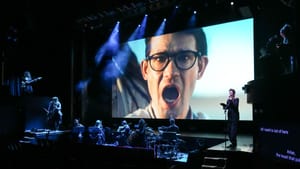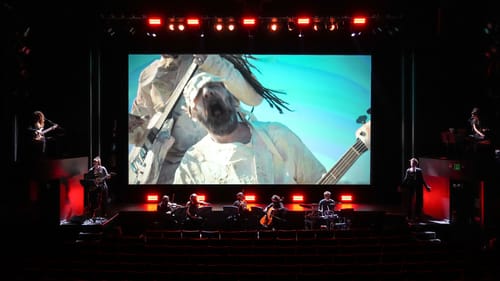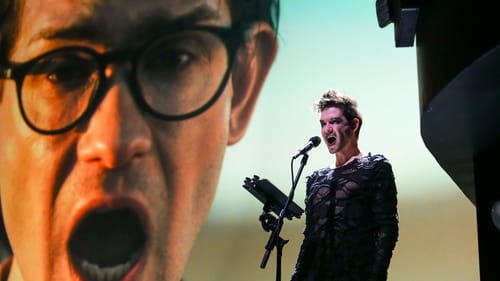Stay in the Loop
BSR publishes on a weekly schedule, with an email newsletter every Wednesday and Thursday morning. There’s no paywall, and subscribing is always free.
Reimagining the operatic form
Philly Fringe 2022 and Festival O22: Opera Philadelphia and Beth Morrison Projects present Black Lodge

Sidelined by the pandemic since 2019, Opera Philadelphia’s ambitious, boundary-pushing annual festival concluded this past weekend, and one of Festival O22’s final presentations was Black Lodge. The live “industrial rock opera concert” performed in front of a big-screen film was created by three enormously talented people who were inspired by the work (and sometime madness) of three other enormous talents and sung by another enormous talent. You might expect a cinematic opera with live music to be complex, layered, thought-provoking, and over the top. You would be right.
Presented at the Philadelphia Film Center, this world-premiere event (also part of the Philly Fringe) was built around the multi-layered non-narrative opera Black Lodge. The work was composed by the widely acclaimed David T. Little (whose film Soldier Songs Opera Philadelphia presented last season) and infused with a non-linear libretto by noted experimental poet Anne Waldman. Noting his dips into “subterranean melancholy” since childhood, Little became fascinated by the dark, disturbing content in the works of theatrical pioneer Antonin Artaud, writer William S. Burroughs, and filmmaker David Lynch. Drawn equally to heavy metal and opera, Little questioned how these three artists might connect. Now a decade after he first posed his question, Black Lodge is the result of his diving into their dark loci—and his own—as Waldman drives the work’s poetic content (“be very careful what you need to know”).
From live to film and back again
Originally commissioned by Beth Morrison Projects, the opera was planned for live performance, and Little completed his score three years ago. But the pandemic caused producer Morrison to shift the project to film, scripted and shot by Brooklyn-based Michael Joseph McQuilken in industrial locations in Maine and Los Angeles. Little subtitles his 180-page score a “ritual opera for solo voice and ensemble,” a work that “reconsiders the operatic form through the lens of experimental theatre, literature, and film [asking] the question how far into darkness one can go before a return to light is no longer possible.”

The hourlong opera is technically in three parts: The Hungry Ghost and Hell Realms; The Animal, Human, and Demigod Realms; and The God Realm of the Shamans. But these divisions were not apparent in the through-performed work, and it would have been helpful in navigating this dense material if they were called out in the opera’s (exceptionally beautiful) printed program. McQuilken’s film, exploring and reflecting the work’s non-narrative structure, is set in a nightmarish Bardo (the Tibetan Buddhist limbo between death and rebirth). There, a tormented writer (Timur, onscreen and singing live here) confronts his darkest moments and faces down his demons as he encounters (over and over) a beautiful, mysterious woman (Jennifer Harrison Newman). That’s it for story, and interpretation(s) is/are up to the viewer.
The film abounds—and over-abounds—with hundreds of dizzying visuals drawn from the oeuvres of Artaud, Burroughs, and Lynch, the composer’s three inspiring nemeses. But the sheer magnitude of these myriad references and McQuilken’s visual forays into the terroir of existential terror—via layered shots, impenetrable images, and sharp cuts—are at first confusing, often exhausting, and ultimately dulling. In lieu of excess, some restraint would be welcome. But it’s a different case with Little’s music.
Scene-stealing musicians
Timur and the eight musicians (playing live) were arrayed in front of and around the Film Center’s big (very big) screen. The film was clearly created to be seen on its own (and it can be, starting October 21 on the opera’s TV channel), but seeing it with live music created a uniquely riveting experience. And central to the music’s force was the remarkable Timur, a classically trained opera singer and rock musician gifted with a spectacular vocal and emotional range. Little wrote the work for baritone, tenor, and countertenor, but Timur encompasses them all. It’s hard to overstate the impact of his deeply felt and beautifully sculpted performance. He was simply thrilling, both to watch and to hear.

Timur was joined by the Dime Museum, his four-piece glam-rock band (Hannah Dexter, Andrew Lessman, Matthew Setzer, and Milo Talwani) and the (amplified) Opera Philadelphia Orchestra string quartet (Luigi Mazzocchi, Elizabeth Kaderabek, Yoshihiko Nakano, and Jennie Lorenzo). This unusual but wonderfully integrated octet played Little’s rangy music with relish, and their virtuosity, coupled with Timur’s performance, made it truly difficult to choose which to watch, the film or the musicians.
Darkness and light
Black Lodge is a bleak and uncompromisingly disturbing film, in love with its own imagery and glorying in its excess visuals. But at the live screening event, Little’s music and Waldman’s libretto, grounded by Timur’s stunning vocal performance and those exceptional instrumentalists, were moving in a way that the composer may have not intended. Though the intellectual content dipped constantly down to explore the darkness (Little’s stated goal), his remarkable music and Timur’s soaring vocals led consistently upward toward the light.
Know before you go: the live performance was sung in English with supertitles. The film includes disturbing scenes of violence and torture.
What, When, Where
Black Lodge. Music by David T. Little; libretto by Anne Waldman; screenplay and film direction by Michael Joseph McQuilken; produced by Beth Morrison Projects. Music performed live by Timur and the Dime Museum with the Opera Philadelphia String Quartet. October 1 and 2, 2022, at the Philadelphia Film Center, 1412 Chestnut Street, Philadelphia. Film streaming via the Opera Philadelphia Channel ($10 single/$99 annual) beginning October 21, 2022. (215) 732-8400 or operaphila.org.
Masks were not required at the Philadelphia Film Center.
Accessibility
The Philadelphia Film Center is a wheelchair-accessible venue.
Sign up for our newsletter
All of the week's new articles, all in one place. Sign up for the free weekly BSR newsletters, and don't miss a conversation.

 Gail Obenreder
Gail Obenreder